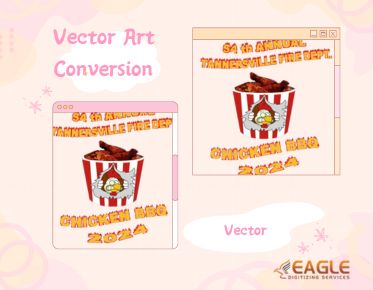Best Mobile Apps for Editing Free Vector Art on the Go
Vectorart has long been a cornerstone of digital design, and today, with the power of mobile apps, creating and editing vectors is more accessible than ever. In a world where flexibility is paramount, mobile apps are changing how we approach vector editing. Imagine creating a logo or illustration while you’re in transit, waiting in line, or taking a break at the park. The benefits of editing vector art on mobile go beyond mere convenience; it’s about unlocking creativity in real-time, whenever inspiration strikes.
Mobile apps bring
the power of vector editing to anyone with a smartphone, breaking down the
barriers of specialized software and expensive equipment. No more sitting at a
desktop to tweak a design – today’s apps make it possible to refine and perfect
artwork in the palm of your hand.
Top Features to Look for in a Vector Editing Mobile App
User-Friendly
Interface: Design Simplicity Meets Power
A great mobile
app for vector editing should balance simplicity and strength. A user-friendly
interface means the app doesn’t overwhelm you with complex menus but still
gives you powerful tools. Look for apps with intuitive controls, logical tool
layouts, and fluid navigation that allow you to work with ease, even on a
smaller screen.
Customizable
Tools for Creative Freedom
The ability to
personalize your tools is invaluable. Customizable tools let you set up your
workspace to match your unique style. Whether it’s adjusting brush sizes, pen
sensitivity, or tool layouts, look for apps that let you control the finer
details, helping you bring your vision to life.
File
Compatibility: Working with SVG, AI, and Other Formats
File
compatibility is essential in vector editing, especially if you’ll be moving
files between apps or sharing them. Look for apps that support multiple file
formats like SVG, AI, and EPS. This flexibility ensures your designs remain
accessible and editable across various platforms, from mobile to desktop.
Best Free Mobile Apps for Editing Vector Art
Inkscape:
The Open-Source Hero for Mobile Vector Editing
Inkscape has long
been a favorite in the open-source community, and its mobile version doesn’t
disappoint. Packed with features usually found only in desktop software,
Inkscape lets you edit paths, apply gradients, and work with layers with
precision. For anyone looking for a robust, free option, Inkscape is a top
choice.
Vectr:
Clean, Simple, and Powerful
Vectr is perfect
for those new to vector art or looking for a streamlined experience. Its
straightforward interface and easy-to-use tools make it a breeze for quick
edits or creating simple designs. Despite its simplicity, Vectr includes all
the core functions needed to make impactful vector art.
Adobe
Illustrator Draw: Adobe’s Lightweight App for Mobile Devices
Adobe Illustrator
Draw brings some of Adobe’s powerful design tools to mobile. While it may lack
the full suite of Illustrator, it’s great for on-the-go design. Equipped with
vector brushes, customizable layers, and seamless integration with other Adobe
products, it’s a top contender for mobile vector editing.
Affinity
Designer: A Full Suite of Features on Your Phone
Affinity Designer
has gained a strong reputation in the design world for good reason. It’s loaded
with features, from advanced color controls to flexible shape tools. Affinity
Designer is ideal for those who want desktop-grade performance in a
mobile-friendly package.
Boxy
SVG: An App Tailored for Precision and Detail
Boxy SVG excels
in detailed vector work. With precise path tools, gradient options, and robust
file compatibility, it’s a powerful choice for designers who need fine control
over their projects. Boxy SVG is particularly popular for users who work
heavily with SVG files and need that extra level of precision.
Editing Tools You Can't-Miss in Vector Art Apps
Path
Editing: Creating and Modifying Curves with Ease
Path editing is
fundamental in vector art, allowing you to shape and manipulate curves for
fluid, organic designs. A good path editor lets you control anchor points
effortlessly, adjust curvature, and fine-tune lines to achieve your desired
look.
Shape
Tools: Drawing Perfect Circles, Squares, and Polygons
Shape tools are
the building blocks of vector art, helping you
create clean and consistent designs. Look for shape tools that allow resizing,
rotation, and easy manipulation so you can create intricate patterns or simple
icons with equal ease.
Pen
Tool Mastery: Precision Drawing and Shaping Your Art
The pen tool is
an artist’s best friend in vector editing, perfect for precise line work and
custom shapes. Mastery of the pen tool opens up endless creative possibilities,
enabling you to bring complex and free-form shapes to life.
Layers:
Organizing Your Design Like a Pro
Layers make it
easy to organize different elements of your design, keeping everything in place
and editable. They’re essential for maintaining order in complex projects,
allowing you to lock, hide, or rearrange parts of your artwork without
affecting the overall composition.
Gradients
and Fills: Adding Depth and Color to Your Work
Gradients and
fills can transform a flat design into something visually captivating. A
gradient tool that offers multiple stops, opacity controls, and blending
options allows you to add subtle color shifts, giving your design depth and
dimensionality.
Working with Free Vector Resources on Mobile
Where
to Find Free Vector Art for Mobile Editing
Numerous websites
offer free vector resources, including Freepik, Vecteezy, and Pixabay. These
sites provide a vast library of vector files you can download and import
directly into your mobile app, making it easy to get started on any project.
How
to Import Free Vectors into Your Editing App
Once downloaded,
most vector files can be easily imported into mobile editing apps. Simply use
the app’s import function to select the file, and it will appear in your
workspace. Some apps even support drag-and-drop functionality, making it
seamless to bring in new resources.
What
to Look for in Free Vector Resources: Quality, Licensing, and More
Not all free
vector art is created equal. When choosing resources, prioritize high-quality,
scalable images that won’t pixelate when resized. Also, pay attention to
licensing—many resources are free for personal use, but commercial use may
require a license.
Customizing Free Vector Art: Making It Your Own
How
to Add Your Personal Touch to Free Vectors
Start by altering
colors, lines, and shapes to suit your style. Customizing pre-made vectors is a
great way to add a unique twist to stock resources, ensuring your designs stand
out while still benefiting from a strong base.
Changing
Colors, Textures, and Patterns in a Few Taps
Most vector apps
make it easy to switch colors or add textures. Experiment with gradients or
even patterned fills to give a fresh look. A few minor tweaks can turn standard
designs into something uniquely yours.
Modifying
Shapes and Lines for Unique Results
Adjusting shapes
and line styles can drastically change the feel of a vectorimage. Simplifying or embellishing parts of the design gives you control
over the final look, allowing for personalized touches that reflect your
creative vision.
Optimizing Mobile Apps for Vector Art Design
Setting
Up Your Workspace: Adjusting Settings for Efficiency
A well-organized
workspace maximizes productivity. Take time to customize your app’s layout,
from tool placements to color palettes, to ensure you have everything within
easy reach. Adjust your settings for optimal performance, especially if you’re
working with detailed or large files.
Maximizing
Touchscreen Controls for Precision Editing
Touchscreens
provide a hands-on approach to editing, but precision can be tricky. Use
gestures like pinch-to-zoom for detailed areas and experiment with sensitivity
settings to make your edits as accurate as possible.
Using
Your Stylus for Fine Details and Accuracy
For artists
working on intricate designs, a stylus can be a game-changer. It provides
better control and accuracy, allowing you to achieve fine details with ease,
particularly in path edits and small adjustments.
Cross-Device Syncing: Accessing Your Projects Anywhere
How
to Sync Your Vector Projects Between Devices
Cross-device
syncing lets you access projects seamlessly, whether you’re on mobile or
desktop. Look for apps with cloud-based storage options so you can switch
devices without losing progress.
Cloud
Integration: Storing Your Designs for Easy Access
Apps that support
cloud storage integration make it easy to access designs from anywhere. Cloud
storage provides a backup and allows for larger projects to be stored without
taking up device memory.
Working
Seamlessly Between Desktop and Mobile Apps
Switching between
desktop and mobile versions of your design software allows for flexibility.
Work on broad strokes on mobile, then fine-tune details on desktop, making the
most of both platforms’ unique strengths.
Tips for Speeding Up Your Workflow on Mobile
Using
Shortcuts and Gestures for Faster Editing
Gestures like a
two-finger tap to undo or swipe for quick access to tools make mobile editing
smoother. Learning shortcuts tailored to your app can significantly speed up
your workflow.
Setting
Up Templates for Quick and Easy Design Starts
Templates offer a
head start on projects, with pre-set layouts and guides that help you move
directly to customization. Many apps allow you to create and save your
templates, perfect for repeat projects.
How
to Use Cloud-Based Assets for Speedier Workflows
Cloud-based asset
libraries keep frequently used resources at your fingertips, reducing the time
spent searching for graphics or icons. They’re especially handy for projects
that require a consistent set of elements.
Best Practices for Mobile Vector Art Creation
Staying
Organized with Layers and Groups
Organizing
elements into layers and groups keeps your project manageable. Locking, hiding,
and grouping related elements make it easier to focus on specific parts without
affecting the whole design.
Using
the Right Resolution for Clear, Sharp Art
High resolution
is key for sharp, clear vector art. Set your project’s resolution based on its
intended display size and format to avoid pixelation.
How
to Keep Your Designs Simple for Mobile Editing
Complex designs
can be hard to manage on mobile. Aim for simplicity, focusing on clean lines
and minimal elements, ensuring your design stays effective on a smaller screen.
Going Beyond the Basics: Advanced Features in Mobile Vector Editing
Exploring
Advanced Path Operations Like Boolean and Clipping
Boolean
operations allow you to merge, subtract, or intersect shapes with precision.
Clipping paths provide a way to mask parts of your design, giving you
flexibility in shaping and positioning elements.
Using
Gradients, Shadows, and Text Effects for Professional Touches
Subtle shadows,
gradient fills, and custom text effects add depth and polish. These effects can
elevate a design from basic to professional, giving it a more finished
appearance.
Advanced
Export Options for High-Quality Vector Files
For those who
need a crisp output, high-quality export settings make a difference. Look for
options to export in print-ready formats or scalable web sizes to ensure your
design looks sharp on any platform.
Mobile vector editing is more than just a convenience—it’s a gateway to creativity anytime, anywhere. With versatile tools, customizable interfaces, and advanced features, mobile apps are unlocking new possibilities for artists and designers alike. Embracing the potential of mobile vector art enables anyone, from beginners to professionals, to create with freedom and flexibility, capturing inspiration wherever it may strike.



 Embroidery Digitizing.png)